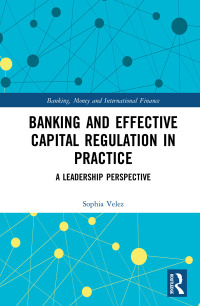Buy Banking and Effective Capital Regulation in Practice: A Leadership Perspective 1st Edition PDF ebook by author Sophia Velez – published by Routledge in 2021 and save up to 80% compared to the print version of this textbook. With PDF version of this textbook, not only save you money, you can also highlight, add text, underline add post-it notes, bookmarks to pages, instantly search for the major terms or chapter titles, etc.
You can search our site for other versions of the Banking and Effective Capital Regulation in Practice: A Leadership Perspective 1st Edition PDF ebook. You can also search for others PDF ebooks from publisher Routledge, as well as from your favorite authors. We have thousands of online textbooks and course materials (mostly in PDF) that you can download immediately after purchase.
Note: e-textBooks do not come with access codes, CDs/DVDs, workbooks, and other supplemental items.
eBook Details:
Full title: Banking and Effective Capital Regulation in Practice: A Leadership Perspective 1st Edition
Edition: 1st
Copyright year: 2021
Publisher: Routledge
Author: Sophia Velez
ISBN: 9780367523619
Format: PDF
Description of Banking and Effective Capital Regulation in Practice: A Leadership Perspective 1st Edition:
Due to a historical lack of attention to the importance of modelling, measuring and managing risk, senior bank leaders are struggling to implement unified practices within their financial institutions that could address the gaps posed by risky management behaviour, rogue trading, liquidity crises, prohibited investments in mortgage-backed securities, and default risks aligned with loans. This book discusses the theories at play between bank agents (bank managers) and their principals (shareholders), a topic which has gained importance as a result of the banking crisis, and similarly, governed the need for more efficient risk management and ethical managerial practices. The author worked with a senior bank leadership team to identify and describe effective capital regulation practices that can lead to a reduction in loss and risky management behavioural practices. The book offers consensus on a number of activities that bank managers can implement to address bank risk. It analyses the relevant factors that determine the necessity for banking regulation and the important role of regulation in managing banking crises. The author’s analysis of the important regulatory aspects in developed countries such as the US, offers a useful conceptual framework for creating an adequate banking regulatory environment in developing countries. This book offers an original contribution to the field of banking that undergraduate, masters, PhD students, academics and researchers can use to gain a deeper understanding of the constructs at play in the banking industry.





